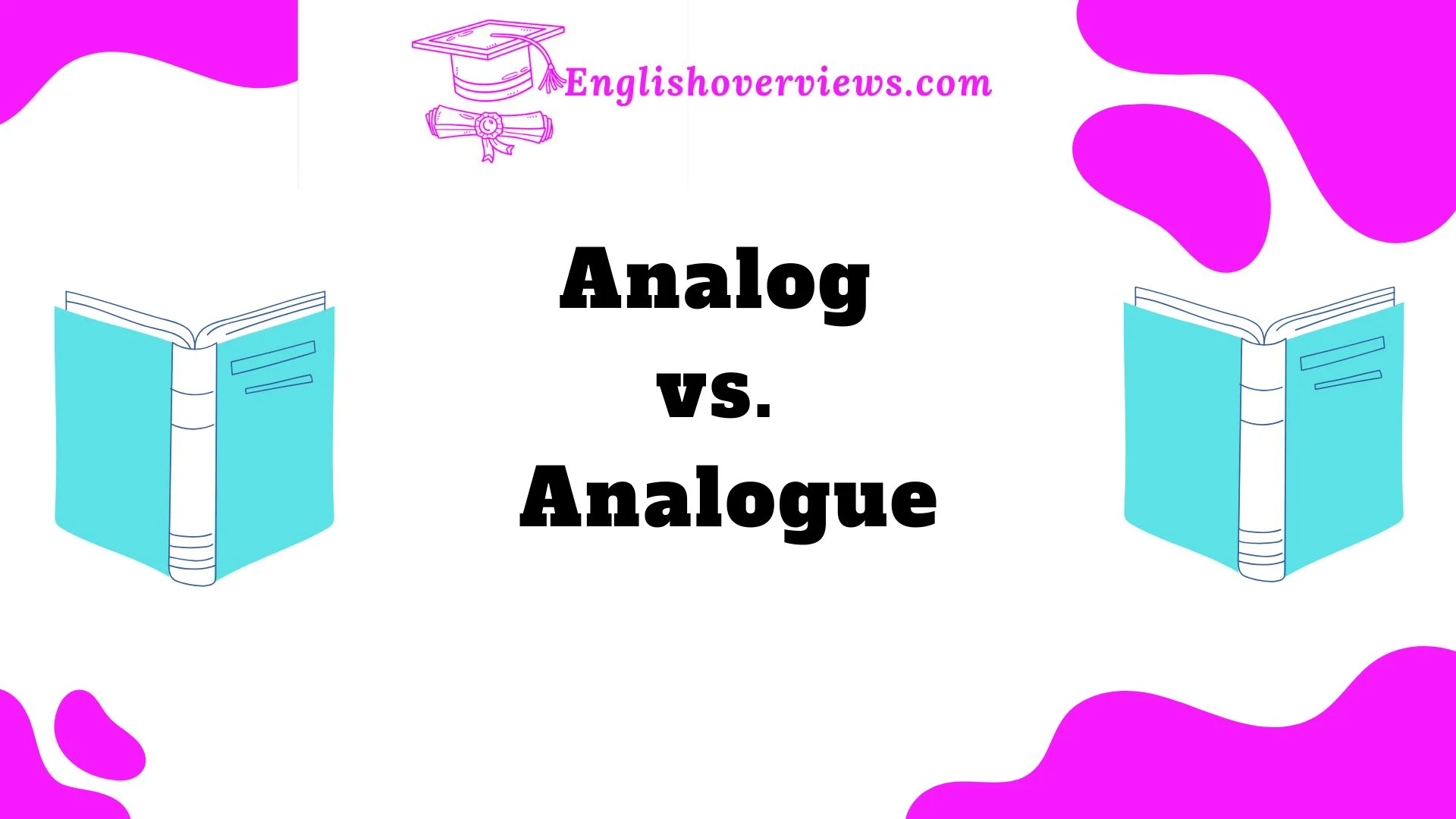Have you ever come across the words “analog” vs “analogue” and wondered why they’re spelled differently? Is one of them a typo, or do they have distinct meanings? The truth is, both words are correct, but their usage depends on regional preferences and linguistic traditions. Understanding these differences can help you communicate more effectively, especially in global settings where English varies widely.
This guide explores the history, usage, and implications of “analog” and “analogue” across different English-speaking regions. Whether you’re a student, a tech enthusiast, or someone curious about language, this article will give you a clear understanding of these terms and when to use them.
Let’s dive into the fascinating world of language evolution, regional preferences, and technological contexts to settle the “analog vs. analogue” debate once and for all.
Understanding the Basics: Analog and Analogue
Both “analog” and “analogue” refer to the same concept: a representation or a thing that is comparable to something else. The difference lies in spelling conventions.
Key Definitions
- Analog: The preferred spelling in American English.
- Analogue: Commonly used in British English and other countries influenced by British linguistic traditions.
Where You’ll Encounter These Words:
- Technology: Analog signals in electronics.
- Metaphors: Describing something as an analogue of another concept.
- Everyday Usage: Referring to non-digital or traditional systems (e.g., analog clocks).
| Term | Region | Example Usage |
| Analog | United States | Analog signal, analog clock |
| Analogue | United Kingdom | Analogue signal, analogue watch |
Both spellings are valid, but using the correct one for your audience is important for clarity and professionalism.
The Historical Context of Spelling Variations
English is a language shaped by history, culture, and regional adaptation. The difference between “analog” and “analogue” is rooted in the evolution of spelling conventions.
Historical Background
- The word originates from the Greek term “analogia”, meaning proportion or comparison.
- Early English usage favored “analogue,” consistent with Latin-derived spellings.
- Over time, American English simplified spellings to make them more phonetic, leading to “analog.”
Why Did This Change Happen?
- Noah Webster’s Influence: His dictionary aimed to simplify American English spelling (e.g., color vs. colour, program vs. programme).
- Industrial Revolution: The rise of technology in the U.S. popularized terms like “analog.”
American English and the Adaptation of ‘Analog’
In the United States, simplified spelling is the norm, making “analog” the standard. This trend is especially visible in technical fields like electronics and computing.
Examples in U.S. Usage
- Analog Signal: Refers to a continuous signal that varies in amplitude or frequency.
- Analog Devices: A U.S.-based company specializing in analog technology.
- Analog Clocks: The traditional, non-digital way to tell time.
Fun Fact:
The American tech industry has significantly influenced global usage of “analog,” especially in fields like semiconductors and audio systems.
British English and the Persistence of ‘Analogue’
British English maintains a preference for traditional spellings, including “analogue.” This spelling is more commonly seen in countries like the UK, Australia, and Canada.
Examples in British Usage
- Analogue Watch: A traditional watch with a face and hands.
- Analogue Television: Refers to the original broadcast technology before the digital transition.
Real-World Case Study:
In the UK, BBC programming often refers to “analogue signals” when discussing the transition to digital broadcasting. This reinforces the regional preference for “analogue.”
Technological Implications of ‘Analog’ and ‘Analogue’
In technology, these terms are used interchangeably, but regional spelling differences can cause confusion. Understanding the context is key.
Analog in Tech
- Common in American publications like IEEE papers.
- Examples: “Analog circuits” or “analog synthesizers.”
Analogue in Tech
- Preferred in European scientific journals and UK-based tech manuals.
- Examples: “Analogue inputs” or “analogue audio.”
| Term | Usage Context | Example Devices |
| Analog | U.S. Tech Industry | Analog synthesizer |
| Analogue | British Tech Manuals | Analogue oscilloscope |
Spelling Consistency Across Regions
Regional Preferences
- American English: Analog.
- British English: Analogue.
- Canadian English: Mixed usage, often leaning British.
- Australian English: Predominantly analogue.
Tips for Spelling Consistency:
- Write for your target audience.
- Use the regional spelling that aligns with your brand or publication standards.
The Comparative Usage: When to Use ‘Analogue’
Sometimes, “analogue” feels more appropriate due to its historical and cultural weight.
When to Use ‘Analogue’:
- Writing for a British audience.
- In academic papers referencing British journals.
- Describing traditional concepts (e.g., “an analogue to an ancient tool”).
Tips to Remember the Difference Between Analog and Analogue
Confused about which to use? Here are some quick tips:
- For American English, think “analog is simplified.”
- For British English, remember “analogue is traditional.”
- Context matters: Use the form that aligns with your audience’s expectations.
FAQs
Q: Are analog and analogue interchangeable?
A: Yes, they have the same meaning but are used in different regions.
Q: Which countries use ‘analogue’?
A: The UK, Australia, Canada (partially), and South Africa.
Q: Does using the wrong term cause confusion?
A: It can in professional or technical writing, so it’s best to match your audience’s preference.
Q: Why did American English simplify to ‘analog’?
A: Simplification was part of a broader effort to make spelling more phonetic.
Q: Is there a universal standard?
A: No, but understanding regional preferences ensures clear communication.
Conclusion: Embrace the Differences
The “analog vs. analogue” debate highlights the rich diversity of English. Whether you use one or the other, the key is to prioritize clarity and audience understanding. By knowing when and how to use these terms, you’ll communicate more effectively and avoid unnecessary confusion.

English Overviews is a resourceful website dedicated to providing valuable content related to grammar and vocabulary. Nauman Anwar has made notable contributions, sharing insights on various subjects, including WordPress themes and plugins. The primary goal of the site is to help users improve their English language skills effectively.











